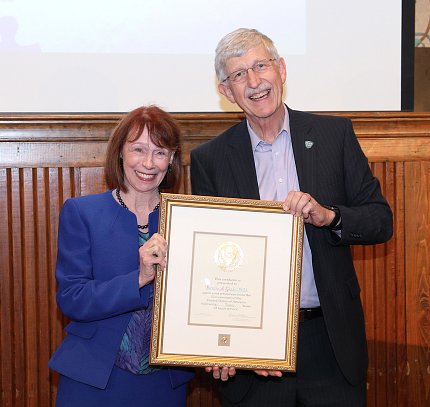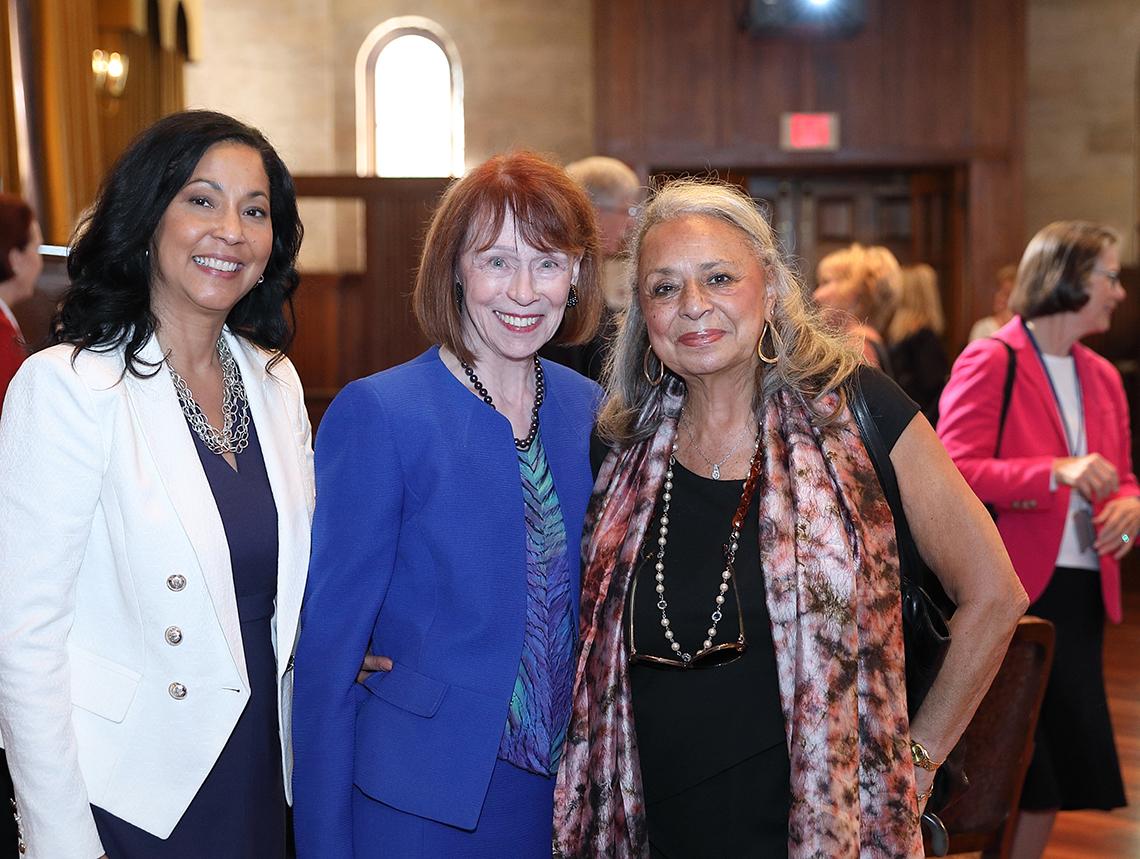NINR Director Grady Retires After 30-Year NIH Career

Photo: Chia-Chi Charlie Chang
Dr. Patricia Grady retired from federal service on Aug. 31 after 30 years at NIH, including 23 years as director of the National Institute of Nursing Research. She began serving as director of NINR in 1995, shortly after the National Center for Nursing Research had been elevated to institute status in 1993.
An internationally recognized researcher with a primary focus on stroke and an emphasis on arterial stenosis and cerebral ischemia, Grady first joined NIH in 1988 as a program administrator in the areas of stroke and brain imaging at the National Institute of Neurological Disorders and Stroke. She later served as NINDS deputy director and acting director.
Under Grady’s leadership, NINR grew from its foundation in supporting the science of patient care to establish nursing science as an integral part of health research and an essential component of the NIH mission. During her time as director, NINR-supported investigators have made countless discoveries that have improved health and quality of life for individuals, families and communities across the nation and around the world.
During her tenure, Grady oversaw development of a strong intramural research program at the institute with NINR becoming a leader in symptom science research at NIH.
Recognizing the collaborative nature of nursing science, Grady championed NINR as a home for interdisciplinary science, with NINR-supported scientists leading teams of nurses, physicians, engineers and many others in developing cutting-edge technologies.
Grady’s vision was vital to the significant growth in the field of nursing research throughout her tenure. She led the development of NINR’s Summer Genetics Institute and Symptom Methodologies Bootcamps, with graduates of both programs themselves becoming scientific leaders.
NINR’s robust support of extramural training under Grady was key to growing the nursing science community. NINR, as a percentage of budget, has devoted more resources than nearly any other institute or center to extramural training awards that have supported new scientists. And, unique among NIH institutes, the majority of NINR grantees are women.
In addition to the institute’s leadership in symptom science research, in 1997, NINR was designated the lead NIH institute for research to improve care of those at the end of life. Grady established NINR’s Office of End of Life and Palliative Care Research, which continues to oversee a research program that has helped individuals, families and clinicians manage the symptoms of advanced illness through improved palliative care and has provided comfort to those at the end of life through better communication, decision-making and clinical care.

Photo: Chia-Chi Charlie Chang
In recognition of Grady’s NIH career, NINR hosted a tribute event on Aug. 23 on campus. Attended by NIH leaders and colleagues from throughout her career, the event featured speakers including NIH director Dr. Francis Collins, Dr. Dushanka Kleinman, associate dean for research and professor at the University of Maryland School of Public Health and former NIDCR deputy director, and Mary Woolley, president of Research!America.
Kleinman reflected on how Grady’s work at NIH and her personal story have been “serious, substantial and foundational” and “stands as a model for others to emulate and to follow…and demonstrates the power that comes with combining the practice orientation of a skilled clinician with the focused inquiry of a seasoned basic scientist and the agility of a strategic science administrator.”
Collins noted that the next NINR director will “have big shoes to fill, but they’re going to come into a space where they can be quite confident there’s a remarkable engine for research and science and discovery—and also people who really care about what they do and about the mission of NINR.” To close out his tribute to Grady, Collins performed a song he had written for the event, sung to the tune of Supercalifragilisticexpialidocious from the Disney musical film Mary Poppins.
The guest of honor also took some time to reflect on her tenure as NINR director. Grady spoke of the significance of deciding to take the road less-traveled in her career: “I’ve been fortunate to be at the helm of a new institute that has grown and blossomed and is poised to do even more as our society increasingly values quality of life, citizen participation in health care, behavioral research and the science of symptoms.”
Before beginning her career in public service at NIH, Grady held several academic positions and served on the faculties of the University of Maryland School of Nursing and School of Medicine.
Her decision to pursue a career in nursing grew from her interest in science and health. After completing her bachelor’s degree in nursing at Georgetown University, she pursued a master’s at the University of Maryland School of Nursing. She remained at the University of Maryland as an instructor of critical care nursing and leadership in the clinical setting. As a clinical nurse, she saw how devastating strokes were for both patients and their families and was intrigued by neuroscience—the science of the brain and the nervous system, which became the focus of her early teaching years.
After becoming director of the University of Maryland’s newly created neurological and neurosurgical division in the School of Nursing, Grady pursued a Ph.D. in physiology from the School of Medicine and began her program of research in stroke. She was elected to the National Academy of Medicine (formerly the Institute of Medicine) and is a fellow of the American Stroke Association. She is also a member of the Society for Neuroscience, the American Academy of Nursing and the American Neurological Association.
Though she has yet to announce what her next professional endeavor will be, Grady will be recognized as NINR director emeritus. As Collins indicated in his statement to the NIH community, “We wish her well as she embarks on the next leg of her journey, which I’m sure will include new adventures in remote corners of the world. I wish her the very best.”
